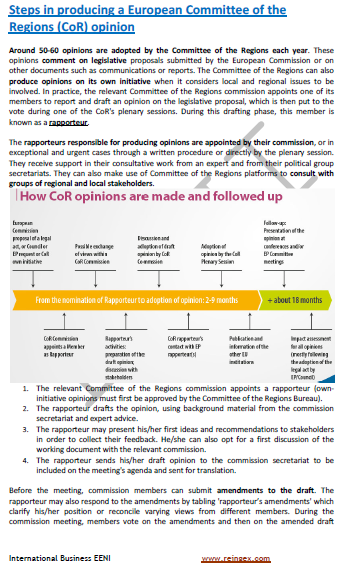European Committee of the Regions, EU

Role of the European Committee of the Regions. EU Legislation
- Introduction to the European Committee of the Regions (EU)
- Principles and responsibilities of the European Committee of the Regions
- Role of the European Committee of the Regions in the elaboration of the EU Policies and Legislation
- The five Priorities Policies of the European Committee of the Regions
The objectives of the subject “European Committee of the Regions” are the following:
- To understand the role of the European Committee of the Regions
- To know their relationship with the EU Policies and Legislation
- To analyze the Priorities Policies of the European Committee of the Regions

The Subject “European Committee of the Regions” belongs to the following Online Programs taught by EENI Global Business School:
Masters: International Business, Foreign Trade.

Languages:  or
or  Comité Regiones UE
Comité Regiones UE  Comité des régions de l’UE
Comité des régions de l’UE  Comité Europeu das Regiões.
Comité Europeu das Regiões.
Credits of the Subject “European Committee of the Regions”: 1 
Masters adapted for  EU Students.
EU Students.
The Committee of the Regions of the EU acts as the assembly of the local and regional representatives of the EU. It is made up of 350 representatives from all the countries of the EU. These representatives can influence the policies and legislations related to their cities or regions.
Sample - European Committee of the Regions:

The European Committee of the Regions consists of 350 members, six commissions and five political groups. It usually holds six plenary sessions annually.
One of the objectives of the European Committee of the Regions is to bring the EU closer to its citizens.
The European Committee of the Regions was established in 1994.
The Committee of the Regions of the EU expresses its views on issues such as economic cohesion, social affairs, transport, education, employment, public health or climate change.
All the countries of the EU (Austria, Belgium, Bulgaria, Croatia, Cyprus, Denmark, France, Estonia, Finland, Germany, Greece, Hungary, Ireland, Italy, Latvia, Lithuania, Luxembourg, Malta, the Netherlands, Poland, Portugal, Slovakia, Slovenia, Spain, the Czech Republic, Romania, and Sweden) are members of the European Committee of the Regions.
The European Committee of the Regions belongs to the European Economic Area (Western Civilization).
(c) EENI Global Business School (1995-2024)
We do not use cookies
Top of this page



